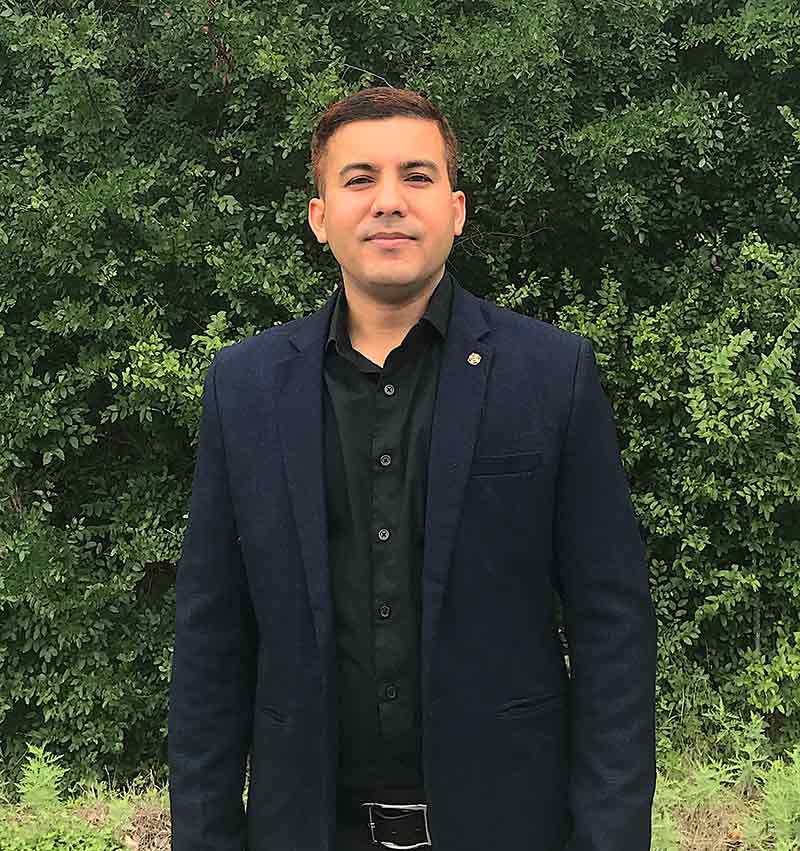Meet a Participant: Kiran Mainali

Kiran Mainali, a recent intern with the National Science Foundation’s (NSF) Mathematical Sciences Graduate Internship (MSGI) Program, traveled to Lawrence Berkeley National Laboratory in California to conduct research related to sparse linear systems.
Turning mathematical theory into application
People generally do not think linear algebra plays an important role in their everyday lives. In fact, they might believe that they left algebra behind in high school.
The truth is that linear algebra is a lot closer than they ever imagined—integral to their daily communication and entertainment technologies.
“The heart of Google is an enormous linear algebra problem,” says Kiran Mainali, a doctoral student in mathematics at the University of Texas at Arlington. “Also, a well-known Netflix problem is a matrix completion problem in math,” he continued. “Most practical applications of technology often require solving enormous systems of equations, millions or even billions of variables for which we apply linear algebra to solve.”
Mainali, a recent intern with the National Science Foundation’s (NSF) Mathematical Sciences Graduate Internship (MSGI) Program, spent a lot of time investigating methods to solve linear systems efficiently.
The NSF MSGI program provides research opportunities for mathematical sciences doctoral students to participate in internships at national laboratories, industries and other facilities. NSF MSGI seeks to provide hands-on experience for the use of mathematics in a nonacademic setting.
NSF MSGI took Mainali to Lawrence Berkeley National Laboratory (LBNL), Berkeley, California. Stationed in the Computational Research Division, Mainali researched under mentor Mathias Jacquelin, Ph.D., to investigate a method of solving linear systems that could minimize the cost of computation and yield better performance.
“Solving large sparse linear systems is important in academic research and industrial applications,” Mainali says. “The development of supercomputers provided us with the opportunity to solve these critical problems, but also brought issues such as memory consumption, accuracy and speed, which are encountered daily by numerical analysts and mathematicians.”
Mainali spent his time studying a direct method for solving a sparse linear system, and he searched for ways to improve its efficiency and reduce computational cost. To do this, Mainali developed a new algorithm that reorders part of the operations performed in the method. He also created MATLAB® computational codes to implement the new algorithm and visualize the results.
Mainali started each day by discussing results from his research with his mentor. Together, they would decide what direction to pursue, and Mainali would spend the rest of his day researching and implementing that next step in his computer code. While Mainali was unfamiliar with the specific research topic when he started his internship, the challenge proved to be an excellent learning opportunity. “I learned not to be afraid of making mistakes, and simultaneously how to teach myself and how to seek help when needed,” Mainali said. He gained programming skills, as well as improved communication and networking skills during his internship.
As a result of his efforts, Mainali succeeded in creating a new algorithm that can be applied to solve large-scale linear systems while reducing the computational time used. “Being an intern with NSF MSGI at LBNL was one of the greatest opportunities in my academic career. Normally when asked about my interests, I would reply that I am interested in problems in numerical linear algebra. Yet, it was all theoretical knowledge until this experience. Now I have seen the application of these tools which makes me more excited to do research and explore new topics,” he said.
Even though Mainali completed his internship, the connections he made at LBNL continue to influence his research and career. Mainali and his program mentor, Jacquelin, continued their collaboration and research remotely. Mainali would like to focus on similar topics he explored during his internship for his doctoral dissertation, and together Mainali and Jacquelin hope to publish their research.
“This experience gave me a new perspective on where I want to head in my career. Overall, I realized that the things we learn in class differ from those we learn in real-world experiences. The only way to connect these two types of knowledge is to be exposed to both. I am grateful I had this opportunity,” said Mainali.
The NSF MSGI Program is funded by NSF and administered through the U.S. Department of Energy’s (DOE) Oak Ridge Institute for Science and Education (ORISE). ORISE is managed for DOE by ORAU.


